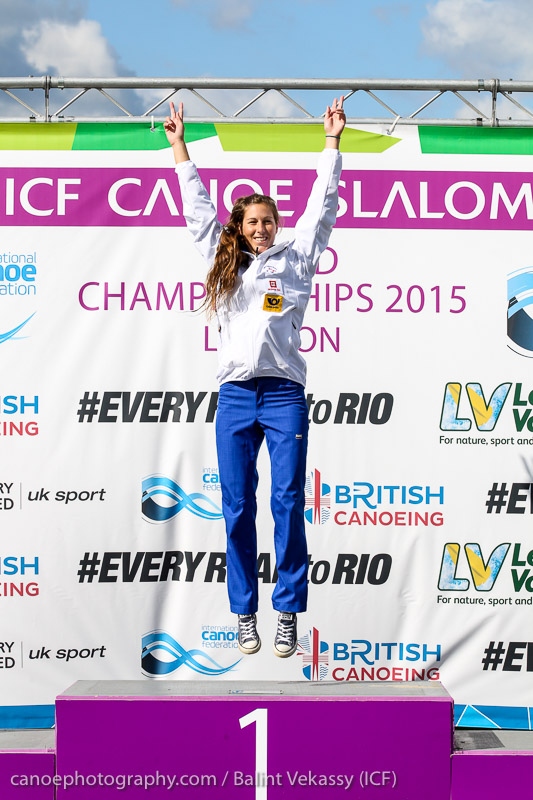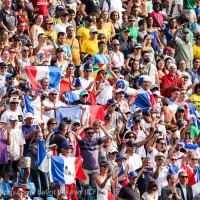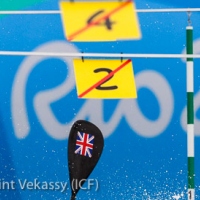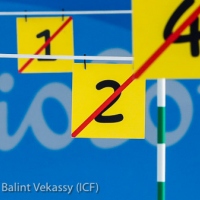Canoe slalom support from the bank - the coach
Today’s posts look both at the important role of the coach and behind the scenes of how the event is judged.
The coach plays a pivotal role in supporting the athlete towards that Ultimate Run. This is not a short-term partnership as the coach and athlete will have spent years working together to hone their performance.
The coach is one member of the athletes' support team that extends to sports psychologists, physiotherapists, dieticians, personal trainers and managers.
Each of the major nation’s competing at Deodoro starting on Sunday has strong management and coaching support teams. They have been working for years to develop future paddlers towards podium finishes.
The sport has developed significantly since it reappeared in the Barcelona Olympics. The more affluent nations already had the availability of basic video cameras for video analysis by 1992 and this is an area that has developed dramatically in the last 20 years.
British Olympic C2M, now Russian Federation coach, Nick Smith and Campbell Walsh Olympic silver medallist (GBR:K1M) help describe;
“Dartfish software now helps us analyse and review our video footage. The split screen head-head function and slow motion with different racers to determine which lines are proving to be the most consistently fast. The differences in angle or position are too often too subtle to notice if we didn’t have this ability to watch both simultaneously and at a slower speed. We will use video clips from the demonstration runs before the race and versus rivals between runs. Then we look at the fastest on each section after the race as part of the review and learning process. In training, paddlers will complete the same sequence of gates many times with different techniques. We use the split screen with the option of watching up to 4 clips on head-head to help understand the differences and determine which was faster”.
One of the best recent examples is the final French selection race between 2014 World Champion, Boris Neveu and 2007 World Champion Sebastien Combot. Combot won by just 0.06 seconds.
Watch the FFCK split screen comparison between Neveu & Combot here
At a more basic coaching level, the coach is able to walk the course that has been set and discuss how the water moves through the gate lines and the likely options or key strokes necessary to complete. In training, the paddler can then run down the course, with the coach providing them feedback on what they actually did versus the ideal. Split times of different paddlers on one specific sequence of gates can be used to uncover where some paddlers are making up time or to evaluate different options. Again, in training the coaches are able to set a course of gates to challenge and test the paddlers.
26-year-old Katerina Kudejova (CZE:K1W) comes to her first Olympics as World Champion
“Mainly it was my coach Jiří Prskavec [Snr], who has taught me everything what I can and devoted me plenty of time. Also I believe my whole training group, because I can watch them during the training”, she commented.

At the national team levels, the coaches are invariably ex-elite paddlers themselves; Pierpaolo Ferrazzi, Paul Ratcliffe, Jurg Gotz, Ettore Ivaldi, Joe Jacobi, Campbell Walsh, Miriam Jerusalmi-Fox, Lisa Micheler-Jones to name a few. Jiri Prskavec noted above was the 1995 World Champion bronze medallist.
It is recognised that the technical knowledge of the coaches and athletes is still the deciding factor in performing well. This needs to have been made solid in training and previous races and then carried over to be automatic for the big event.
The paddlers have no opportunity to practice on the set of gates that are set by the international course designers. This makes video analysis all the more important during the race between respective runs to examine where paddlers are gaining or losing precious seconds.
Smith concludes by describing what will make the Olympic medallists;
“As usual in our sport, a bit of luck with the water but over and above is a calm head and ability to deliver on the hardest of whitewater courses.”
Canoe Slalom Sponsorship, Funding and Media
Olympic level athlete development is inextricably related to sponsorship, funding and the media. France has more athletes in the top ICF world ranking across all classes than any other nation. Germany has more athletes in the top 10 across the four Olympic classes than any other nation. Others such as Australia, Great Britain, Czech Republic and Slovakia have a tremendous depth of talent. Look at the previous post on Junior & U23 paddlers on the rise for evidence of this.
Sponsorship, funding and its relationship with the media has much to do with how canoe slalom has evolved in the last twenty years.
Media coverage and sponsorship are intricately related in a chicken and egg way. Media coverage brings sponsors but without sponsorship, it is challenging to get the media coverage. This was our reality in the pre-Barcelona era of the sport. There were some limited sponsors to whom we were exceedingly grateful and there was some limited media coverage.
Broadcasting rights make up a reported 47% of the IOC Games revenue, with 45% then accounted for by sponsorship.
National sports funding also creates high stakes for athletes from a selection perspective. Any funding is always limited and so there are qualifications for different funding programmes. Invariably, while some athletes benefit from funding others miss the cut off for funding and so have to find alternative ways to fund their further training and purchase of equipment and travel until the next funding cycle. The cost of travel both for local training and international training has always been one of the largest components in canoe slalom.
Twice World Championship silver medallist Fiona Pennie (GBR:K1W) adds, “For the British team, the World Championships are the most important race in the year with the Olympics holding even greater importance every 4 years. The results contribute to the UK Sport funding process. We race a few of the World Cup series each year for experience and give us a gauge of our current performance.”
The media interest in all the athletes is a new pressure on the athletes. It shows the thirst for information, which should do much to bring canoe slalom into the minds of the public.
Keep tuning in
Our second post today looks at the Judge. Tomorrow’s posts examine canoe slalom from behind the photographer’s lens as well as the atmosphere of live race commentary.
We welcome your interaction. Remember to use hashtag #ICFslalom across all social media. Please comment through @PlanetCanoe on Twitter





